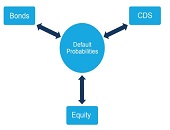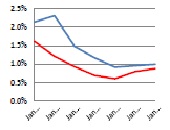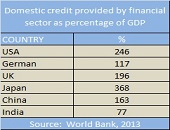New World Order 1
From trade wars to 5G technology, issues in China are having an impact on the Canadian investment environment and capital flow decisions. What effect will China’s ascendance have on the global economy? What is the best strategy to ride the wave upward? What are potential danger areas? On June 15, 2020, Herbert Zhang, the chair of the institutional asset management committee of the CFA Society Toronto, welcomed three panellists at the webinar titled, “New World Order: How China’s Rising Affects Investment Strategy.” The panellists shared their thoughts on how investors should view US-China trade tensions and deal with the associated […]
Shadow Banking in China
Shadow banking has enjoyed extraordinary growth over the past decade, especially in the emerging markets of China. The implications were discussed in the webinar “Shadow Banking: Standing at the Precipice?” sponsored by the Global Association of Risk Professionals (GARP) on August 6, 2019. Cindy Li, a Greater China analyst of the Federal Reserve Bank of San Francisco, was the second of two speakers at the one-hour GARP webinar. She said the shadow banking system in China has evolved to a fairly large group of powerful competitors, but that has led to “a build-up of risk” as China’s economic growth slows down. First, […]
Standing at the Precipice?
What is shadow banking, and are the associated risks being properly mitigated? A summary of issues can be found in the webinar “Shadow Banking: Standing at the Precipice?” sponsored by the Global Association of Risk Professionals (GARP) on August 6, 2019. Fabio Natalucci, Deputy Director, Monetary and Capital Markets Department of the International Monetary Fund (IMF), was the first of two speakers at the one-hour webinar. He began by explaining that the shadow banking system prefers to be thought of in “less sinister” terms as “non-bank financial intermediaries” that provide services similar to, but outside of, the regular banking system. He described […]
Managing Artificial Intelligence Risk
“The potential consequences of artificial intelligence are profound,” said Daniel Wagner, founder and CEO, Country Risk Solutions. “We’re just at the beginning of the runway. How resources are utilized will change significantly.” AI will affect all areas of life, and it is possible new forms of digital authoritarianism may arise. Wagner was one of two speakers at a webinar titled “Artificial Intelligence: Running the Race and Managing the Risks,” sponsored by the Global Association of Risk Professionals (GARP) on October 16, 2018. Wagner and Keith Furst co-authored the new book AI Supremacy: Winning in the Era of Machine Learning. His presentation summarized […]
Mega-Platforms, Mega Risk
There’s a world of difference between innovation and disruption. “Think of innovation as doing more, in the same old way,” said Haydn Shaughnessy, innovation specialist and author of Platform Disruption Wave: How the Platform Economy is Changing the World. He presented a GARP webinar on “The Rise of Mega-Platforms and the Risks to Banking” on May 25, 2016. In the first part of his talk, he described mega-platforms. He referred to the thesis of The Innovator’s Dilemma: When New Technologies Cause Great Firms to Fail by Clayton Christensen. This book argues that successful companies get so caught up in meeting […]
When Data Is Sparse. Part 2
It’s difficult to model sovereign credit risk for emerging markets using structural models such as the Merton model because “calibration is always an issue,” said Rob Stamicar, Senior Director of Research in Multi-Asset Class Risk Management at Axioma, continuing a theme during the second half of his webinar on December 2, 2014. During the first half, he showed how the probability of default can be used as a common link among the asset classes of interest (bonds, swaps, and equities). In the second half, he focused more on sovereign credit risk. Calculation of sovereign risk could be done directly, “but […]
Public vs Private Banks in India and China
“Public sector banks perform worse than private banks In India whereas there is no significant performance difference for the two sectors in China,” said Dr. Rajan Singenellore, Global Head of the Default Risk and Valuation Group at Bloomberg. He gave an overview of operational performance and credit risk trends in Banking in Emerging Markets, and was the third of three webinar panellists on November 20, 2014, organized by the Global Association of Risk Professionals. For both countries, Singenellore compared government-owned banks with private sector banks. The terminology is different: India has public sector undertakings (PSU) banks whereas China has state-owned […]
“Expect More Niche Customer Targeting”
In India and China, “large state-owned banks often have a significant constraint on their ability to manage liabilities,” said Professor Moorad Choudhry from the Department of Mathematical Sciences at Brunel University and author of Principles of Banking. He was the second of three panellists at the webinar Banking in Emerging Markets held on November 20, 2014, organized by the Global Association of Risk Professionals, and his role was to describe “operational realities.” The 2018 advent of new Basel III rules for capital and liquidity requires 100 percent compliance with new rules on the liquidity coverage ratio (LCR) and the net […]
“Lending Will Be Marketing Gimmick”
What will be the effect of Basel III on banks in emerging markets? “Commercial banks will become less interested in providing loans,” said Dr. Michael C. S. Wong, the first panellist in a webinar on Banking in Emerging Markets held November 20, 2014, and sponsored by the Global Association of Risk Professionals. He is Associate Professor of Finance at City University of Hong Kong, and Chairman at CTRISKS Rating. Wong summarized the challenges of the new Basel III regulatory regime, with its tougher capitalization and liquidity requirements. A global systemically important bank (G-SIB) will have additional capital and cash-holding requirements, he said, […]
China: Global Leader, Threat, or Both? Part 2.
“The likelihood of conflict is low but non-negligible” when it comes to China’s perspective on Japan’s re-militarization, said Daniel Wagner, CEO of Country Risk Solutions, during the second half of his Global Association of Risk Professionals webinar on October 22, 2013. After surveying Sino-American relations in Part 1, Wagner guided the audience through an in-depth look at China’s evolving geopolitical position in Asia and Africa. Japanese Prime Minister Shinzo Abe has raised military spending, loosened constitutional constraints on military action, and given a high profile to the Senkaku Islands dispute. Sabre-rattling occurs, but Wagner doubts that China and Japan would […]










